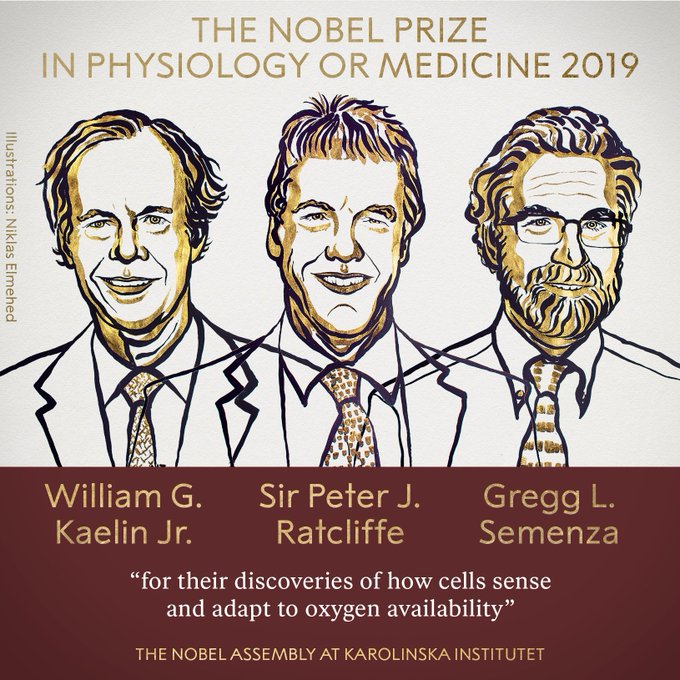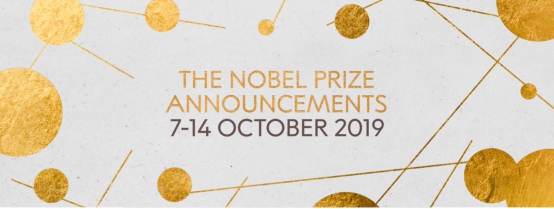The 2019 Nobel Prize in Physiology or Medicine was announced! Kailin and other three people won the prize.
[Global Network News] According to the latest news from the official website of the Nobel Prize, at 17: 30 on October 7, Beijing time, the Karolinska Medical College in Sweden announced that it would jointly award the 2019 Nobel Prize in Physiology or Medicine to William G. Kaelin, Peter J. Ratcliffe and Gregg L. Semenza for their discoveries.

The Nobel Prize in Physiology or Medicine was established according to the will of the late Swedish chemist alfred nobel, aiming at commending those who made outstanding discoveries in physiology or medicine in the previous year. The front of the Nobel Prize in Physiology or Medicine is a bust of Nobel, the right is the year of birth and death of Nobel (Roman numerals), and the author’s signature is "E.LINDBERG 1902" in the lower left corner. The design on the back of the medal is the health goddess Xu Guiya in ancient Greek mythology, who is collecting spring water from rocks to quench the thirst of sick girls. The medal is engraved with a Latin sentence, which roughly translates as: New discoveries make life better.
The prize was first awarded in 1901, and was selected by Karolinska School of Medical University in Stockholm, Sweden. The award ceremony was held on December 10th every year (the anniversary of Nobel’s death).
On October 8, 2015, China scientist Tu Youyou won the 2015 Nobel Prize in Physiology or Medicine, becoming the first Chinese to win the Nobel Prize in Natural Science. Tu Youyou, who has been engaged in the research of combining traditional Chinese medicine with western medicine for many years, creatively developed a new antimalarial drug — — Artemisinin and dihydroartemisinin have achieved 100% inhibition rate against plasmodium, which points out a direction for Chinese medicine to go global.

Winners of Nobel Prize in Physiology or Medicine in Recent 5 Years
In 2018, American immunologist James Allison and Japanese biologist Tasuku Honjo won the Nobel Prize for their contribution to the discovery of negative immunomodulation therapy for cancer.
In 2017, three American scientists, Jeffrey Hall, Michael Rothbash and Michael Young, won prizes for their achievements in studying the molecular mechanism of the biological clock.
In 2016, Japanese scientist yoshinori ohsumi won the prize for his achievements in the study of autophagy mechanism.
In 2015, Tu Youyou, a female pharmacist in China, William Campbell, an Irish scientist, and Satoshi Omura, a Japanese scientist, won prizes for their achievements in the research on the treatment of parasitic diseases.
In 2014, John O’Keefe, a scientist with American and British citizenship, and May-Britt Mo Ze and Edward Mo Ze, two Norwegian scientists, won prizes for their research on finding cells in the brain localization system.
Some historical data since the Nobel Prize in Physiology or Medicine was awarded (1901-2018);
109 times
Since 1901, the Nobel Prize in Physiology or Medicine has been awarded 109 times. It was not issued in 1915, 1916, 1917, 1918, 1921, 1925, 1940, 1941 and 1942. Of the 109 awards, 39 were awarded to a single winner, 33 were shared by two people and 37 were shared by three people.
216 people
So far, there are 216 winners of the Nobel Prize in Physiology or Medicine, and so far no one has won the prize twice, with an average age of 58. The youngest winner of the Nobel Prize in Physiology or Medicine is Frederick G. Banting, a Canadian surgeon who invented insulin. He was only 32 years old when he was awarded the Prize in Medicine in 1923. The oldest winner was Peyton Rous, an American virologist who discovered tumor-induced virus. He was 87 years old when he won the medical prize in 1966.
12 women
Of the 216 Nobel Prize winners in Physiology or Medicine, 12 are women. Among them, American cytogeneticist Barabara McClintock is the only winner who won the award alone. The woman scientist who recently won the prize is Tu Youyou from China.
family
Husband and wife: Gerty Cori and Carl Cori won the Nobel Prize in Physiology or Medicine in 1947; May-Britt Moser and Edvard I. Moser (now divorced) won the 2014 Nobel Prize in Physiology or Medicine.
Father and son: Hans von Euler- chelpin(1929 chemistry prize) and Ulf von Euler(1970 medicine prize); Arthur Kornberg (medicine prize in 1959) and Roger D. Kornberg (chemistry prize in 2006).
Brothers: Jan Tinbergen(1969 Prize in Economics) and Nikolaas Tinbergen(1973 Prize in Medicine).
"Little Plum" in Nobel Prize Circle
Sigmund Freud (1856-1939), an Austrian neurologist and founder of psychoanalysis, was nominated for the Nobel Prize in Physiology or Medicine 32 times, but never won the prize. Nobel Prize nominations are kept secret for 50 years.